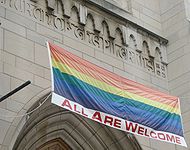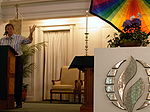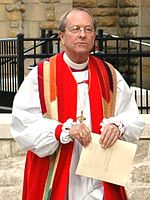- Ordination of LGBT Christian clergy
-
Part of a series on
LGBT topics and ChristianityChristianity and homosexuality
Christianity and transgenderism
History of Christianity and homosexuality
The Bible and homosexuality
Queer theology
Blessing of same-sex unions
Ordination of LGBT clergy
LGBT-affirming churchesDenominational positions Anglican · Baptist · Eastern Orthodox · Latter-day Saints · Lutheran · Methodist · Presbyterian · Quaker · Roman Catholic · United Church of Christ · Uniting Church in Australia · Metropolitan Community Church The ordination of lesbian, gay, bisexual or transgender clergy who are open about their sexuality, are sexually active, or are in committed same-sex relationships is a debated practice within some contemporary Christian Church communities.
While the majority of churches are opposed to it because they view homosexuality as incompatible with Biblical teaching and traditional Christian practice [1], there are an increasing number of Christian churches and communities that are open to the ordination of people who are gay and lesbian. These are mainly moderate and liberal Protestant churches and include the Metropolitan Community Church and the Church of Sweden where clergy may serve in senior clerical positions.
The issue of ordination has caused particular controversy in the worldwide Anglican communion, following the appointment of the Bishop of New Hampshire in the US Episcopal Church.
Contents
Protestantism
Moderate and Liberal Protestant denominations
In the United States, most moderate and liberal Protestant churches either already ordain openly gay or lesbian clergy or are in the processes of discussing it. For example the Reformed Church in America, and the Moravian Church [2], are discussing it while the Evangelical Lutheran Church (ELCA), the Episcopal Church, and the Presbyterian Church [3] [4] approved rules to ordain openly gay or lesbian clergy.
The Evangelical Lutheran Church in America decided in August 2009 to accept gay clergy in sexually active monogamous relationships.[5] In July 2011 also Evangelical Lutheran Church in Canada decided to accept gay clergy in sexually active monogamous relationships.
The Universal Fellowship of Metropolitan Community Churches is the first denomination with an official stance allowing non-celibate gays and lesbians to be ordained; it is also one of the fastest growing denominations in the United States and the United Kingdom. Smaller denominations, like the Liberal Catholic Church, the Swedenborgian Church of North America and the Apostolic Johannite Church also do so.
The United Methodist Church has also been discussing the issue for many years, but its official position continues to deny ordination to "Self-Avowed Practicing Homosexuals." In theory, a homosexual who is celibate is a fit candidate for ordination within the United Methodist Church, but in practice this rarely happens.
In Scandinavia, the Church of Sweden permits openly gay and lesbian clergy to act as ministers, often in senior positions. In May 2009 the Diocese of Stockholm elected Eva Brunne as its Bishop-Elect. Brunne lives in a registered partnership with another woman, who have a son. Likewise the Danish National Church in Denmark, and the Church of Norway permit the ordination of openly LGBT clergy. Also Evangelical Lutheran Church of Finland and Church of Iceland permit the ordination of openly LGBT clergy.
In Germany, the Lutheran, United and Reformed churches as part of the Evangelical Church ordain openly LGBT Christian clergy.[6][7] In 2008, the North Elbian Evangelical Lutheran Church announced with Horst Gorski has been nominated as a lutheran bishop, but did not make election. [8]
The Protestant Church in the Netherlands also ordains openly LGBT Christian clergy.
The United Church of Canada and the Uniting Church in Australia [9] already welcome gays and lesbians in permanent partnerships into the ordained ministry. The United Church of Christ, because of its decentralized model that arose from the Congregational churches of New England, allows such ordinations by default since there are no official denomination-wide stances on doctrine.
The Christian Church (Disciples of Christ) has a decentralized church structure as well. Regional bodies ordain individuals and as such have different rules regarding ordination. Northern California is the only region labeled as Open and Inclusive; however, the Ohio Commission on Ministry (the body that grants ordination) has decided that sexual orientation is not a criterion for ordination. Other regions are in the process of investigating the matter, mostly on a polity (since congregations determine ethical fitness for candidates and hire their ministers) and not a theological basis.
In 2009, the British Quakers confirmed the Church was open for LGBT ordination and said issued support for same-sex marriage. [10]
The Church of Scotland discussed the issue at its 2009 General Assembly. This was in response to the induction of openly gay minister Rev. Scott Rennie, to serve at Queen's Cross Church, Aberdeen. The outcome was agreement that the induction, which had triggered the debate, should go ahead, but that no further such cases should be permitted until a commission on the subject has reported in 2011. In 2011, Church of Scotland voted at its 2011 General Assembly to allow open gay and lesbian ministers who live in civil unions. [11]
The Christian United Church decided to ordain openly LGBT Christian clergy at First Annual Conference in Seattle, WA [12] in 2010.
Conservative Protestants
To many conservative Protestants, homosexuality is interpreted in terms of behavior. A homosexual is a person who engages in same-sex behavior. These denominations also interpret the Bible as condemning homosexuality.
The ordination of gays and lesbians is not a new thing, but their ordination as openly practicing homosexuals has caused controversy among some churchgoers: a 2006 survey suggested that two-thirds of weekly Protestant church-goers in the United States of America believe that it is inappropriate for gays and lesbians to serve as bishops or pastors; with the number opposed rising to 80% amongst evangelical Christians.[13] In the past, ordinands who were gay or lesbian did not admit their sexuality, and were ordained.[citation needed]
Anglicanism
For many years, moderate and liberal western Anglican Provinces operated on a basis of "don't ask, don't tell". [14]
In the American Episcopal Church, a resolution was adopted in 2009 by the General Convention, the Church's governing body, declaring that gays and lesbians who had been baptized were eligible for "any ordained ministry," including becoming bishops.[15] In the wider Anglican Communion, which includes more conservative congregations in developing countries, the ordination of homosexuals is highly controversial.
In 1999, open gay anglican bishop Peter Wheatley was ordained as bishop of Edmonton in London. The Archbishop of Canterbury, spiritual head of the Anglican Communion, formed the Eames Commission due to controversy associated with the consecration of Gene Robinson to the order of bishop in the Episcopal Diocese of New Hampshire and the planned consecration of Jeffrey John (who was to be ordained Bishop of Reading) in the Church of England. Its findings, published as the Windsor Report, recommended that the consecration of individuals in same-sex relationships as bishops cease, although it conspicuously avoided discussing gays and lesbians ordered as priests and deacons. In response, the Episcopal Church placed a moratorium on confirming the consecrations of all bishops.
Episcopal Bishop J. Neil Alexander of the Diocese of Atlanta said he voted for the ordination of Gene Robinson as bishop because Robinson was open about his sexuality and honest about his caring relationship. In the past known gay clergy were ordained to the episcopate only because they lied about their sexuality.
In July 2009, clergy and laity in the US voted to reject the three-year moratorium on the consecration of gay clergy. The Archbishop of Canterbury responded to this in a statement which regretted that this move would not heal the divisions in the church, and effectively sets in motion a two-tier system of Anglicanism in which those within the covenant can speak as Anglicans, and LGBT clergy and those who support them fall outside the covenant, and so cannot speak on behalf of other Anglicans.[16] A coalition of thirteen LGBT Christian groups in the UK formulated a united response to the Archbishop's statement, questioning whether the 'listening process' he had called for had been properly engaged with, that LGBT people are committed members of the communion, and criticising a 'two-track' system within Anglicanism.[17]
In August 2009, it was announced that two gay Episcopal priests were among the six nominated candidates for the role of suffragan bishop of Los Angeles; both were in committed relationships. The appointment was voted on in December 2009, and in March 2010 it was announced that Mary Douglas Glasspool had been elected; becoming only the second openly gay bishop in the Episcopal Church. In December 2009, the Episcopal Diocese of Minnesota also announced a lesbian had been nominated as a bishop, but did not make election [18].
Formed in opposition to the Episcopal Church's policies concerning gays and lesbians are several other Anglican church bodies. The Anglican Mission in the Americas was founded in 2000 by the Anglican Communion's Rwandan and Southeast Asia provinces to serve North American Anglicans formerly affiliated with the Episcopal Church and the Anglican Church of Canada; it claims more than 100 parishes in the United States. A church-planting partner with the Anglican Mission is the Anglican Church in North America, founded in 2010. It claims over 600 parishes serving 100,000 members, most of whom are former members of the Episcopal Church opposed to the ordination of LGBT clergy. The Anglican Church in North America includes four dioceses which withdrew from the Episcopal Church and subsequently joined with the 13,000 member Reformed Episcopal Church and several smaller bodies.
In addition, the even more conservative Continuing Anglican movement is composed of various churches which were formed in the late twentieth century by former Episcopalians opposed to what they believed were liberal and un-scriptural developments within the parent body. Although the place of homosexual persons in the life of the church was not one of the causes of these churches' separation from the Anglican Communion, all of them are strongly opposed to both the ordination of gay clergy and to church-approved matrimonial rites for LGBT persons.
An interfaith movement known as the Confessing Movement has also been a vehicle for opposition to the ordination of non-celibate gays and lesbians.
In 2011, Church in Wales gives pensions for gay partners of clergy. The Church of England General Synod approved the change in 2010. [19]
Roman Catholicism
Main article: Homosexuality and Roman Catholic priestsAccording to the Catholic Church's moral doctrine, homosexual attraction is disordered, and homosexual acts themselves are sinful. However, the Church does allow the ordination of men who may have, in the past, experienced same-sex attraction, but only on the condition that they have lived without engaging in "homosexual culture" or acts for several years, and that have no "deep-seated homosexual tendencies".[20] All priests are required to take the vow of celibacy and to live by the Church's moral teachings.
Despite the official position, some studies in the United States have suggested that at least a third of all priests in the US Catholic Church may be gay[21]. A 2006 survey suggests that Roman Catholic church-goers in the US are evenly split on whether homosexual men should or should not serve as priests or bishops[13].
Latter-day Saints
Main articles: Homosexuality and The Church of Jesus Christ of Latter-day Saints and Priesthood (LDS Church)The Church of Jesus Christ of Latter-day Saints ordains to the priesthood only men who have covenanted not to have sex with anyone besides their wife. Some gay men have chosen to remain celibate, while others have chosen to marry.[22] Regardless of orientation, only married men may become bishops.[23] Transgendered persons who were born men may only receive the priesthood if they have not had, and are not planning to have, an operation to change their gender (1999 Church handbook).[specify] Women are not ordained to the priesthood.
Literature
- David Berger: Der heilige Schein: Als schwuler Theologe in der katholischen Kirche. Berlin 2010, ISBN 978-3-550-08855-1
- Gene Robinson: In the Eye of the Storm: Swept to the Center by God, with foreword by Desmond Tutu, New York City: Seabury Books, 2008
See also
- Gay bishops
- Homosexuality and Anglicanism
- Homosexuality and Christianity
- Homosexuality and Roman Catholic priests
- List of Christian denominational positions on homosexuality
References
- ^ Diarmaid MacCulloch, The Reformation (New York: Viking, 2004), 601.
- ^ Moravian Church:Recognition of ordination
- ^ epd:USA: Presbyterianer-Versammlung für Homosexuelle im Pastorenamt (german)
- ^ Advocate:Presbyterians approve gay clergy
- ^ StarTribune:ELCA votes to allow gay pastors
- ^ Theologische, staatskirchenrechtliche und dienstrechtliche Aspekte zum kirchlichen Umgang mit den rechtlichen Folgen der Eintragung gleichgeschlechtlicher Lebenspartnerschaften nach dem Lebenspartnerschaftsgesetz, September 2002 (german)
- ^ EKD:EKD-Synode beschließt neues Pfarrdienstgesetz (german)
- ^ Welt:Wird er Deutschlands erster schwuler Bischof ? (german)
- ^ BBC:Australia church accepts gay priests
- ^ Guardian:Quakers make the right decision
- ^ Guardian:Church of Scotland votes to allow gay and lesbian ministers
- ^ 1st Annual Conference of Christian United Church
- ^ a b http://www.rasmussenreports.com/public_content/politics/current_events/general_current_events/churchgoers_disapprove_of_gay_and_lesbian_pastors
- ^ Gay Catholic priests and clerical sexual misconduct; by Donald Boisvert, and Robert Goss
- ^ http://www.edgeboston.com/index.php?ch=news&sc=&sc2=news&sc3=&id=94111
- ^ Communion, Covenant and our Anglican Future
- ^ On the Archbishop's Reflections. Inclusive Church, 4th August 2009
- ^ http://www.pinknews.co.uk/news/articles/2005-13539.html
- ^ Pinknews:Welsh clerics to consider pensions for gay partners
- ^ Full text of the 2005 Vatican document on ordaining homosexuals into the priesthood
- ^ Dr Elizabeth Stuart Roman Catholics and Homosexuality quoted by Kate Saunders in Catholics and Sex
- ^ Moore, Carrie A. "Gay LDS men detail challenges", Deseret Morning News, March 30, 2007
- ^ Interview with Elder Oaks and Wickman
Lesbian, gay, bisexual and transgender topics and religion Overview: Homosexuality and religion · Transgenderism and religion
Religions: Abrahamic: Bahá'í Faith · Christianity (Anglican · Baptist · Latter-day Saints · Lutheran · Methodist · Presbyterian · Quaker · Roman Catholic) · Judaism (Conservative) · IslamIndian: Buddhism · Hinduism (Hare Krishna) · SikhismOther: Other: LGBT-affirming religious groups (Judaism · Christianity) · Ordination of LGBT clergy (Judaism · Christianity) · The Bible · Hijra · Two-spirit · XanithCategories:- Homosexuality and Christianity
- LGBT clergy
Wikimedia Foundation. 2010.


